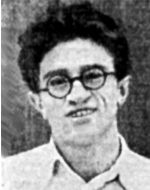Oslander (national), Amram (Omri)
Son of Bluma and Alexander Zusha, was born on October 6, 1928, in Neribator, in northeastern Hungary. His passion for Eretz Israel came from from his teachers in the cheder, in addition to his studies in the elementary school of the Jewish community in Hungary. He sought and found a way to fulfill the aspirations of the Hashomer Hatzair movement. He was the only Jewish and Hebrew-speaking Jew among assimilated children who came to the movement from other circles. In terms of the difference in his past and education, he was unusual among the members, but everyone recognized the value of his spiritual guidance, both in the general ideological aspect of the movement and in teaching the way to return to Judaism and Eretz Israel.
Amram immigrated to Israel in 1943, joined the youth movement at Kibbutz Shaar Haamakim and received training and education there. He overcame his physical weakness, struggled with the difficulties of adapting to physical labor, and his happiness grew with the increase in his achievements at work and his acclimatization in agriculture. Amram expressed his feelings in lists and poems in lively, juicy Hebrew that he wrote not for publication, but for himself. When the youth group decided to join Kibbutz Shaar HaAmakim, he tried to resist going to a place where others had already laid down their foundations and wanted to embark on a struggle with the wilderness in a new place. But at last he was obeyed by the movement and stayed with his friends at Sha’ar Ha’amakim.
In 1946 he enlisted in the Palmach and trained at Sha’ar Ha’amakim and Sarid, completing a course for paramedics and completing his service in clinics, as well as taking part in raising the Ma’apilim from the ship to the Nahariya shore, and in retaliation in Balad a-Sheikh after the massacre at the refineries, as well as in operations against the enemy’s escapes from Lebanon, and in March 1948 he was released and returned to the valley gate, but was immediately required to return to service with the assistance required of the agriculture. After the defeat of the Kaukji Liberation Army, the occupation of Waldheim and Umm a-Zinat, and the defense of Kibbutz Gesher in the Jordan Valley. On the 11th of Iyar, May 20, 1948, the Syrians carried out a heavy attack, aided by armor and artillery, but were repulsed, and in this battle he fell in defense of Degania Bet and was brought to rest in the kibbutz cemetery.
